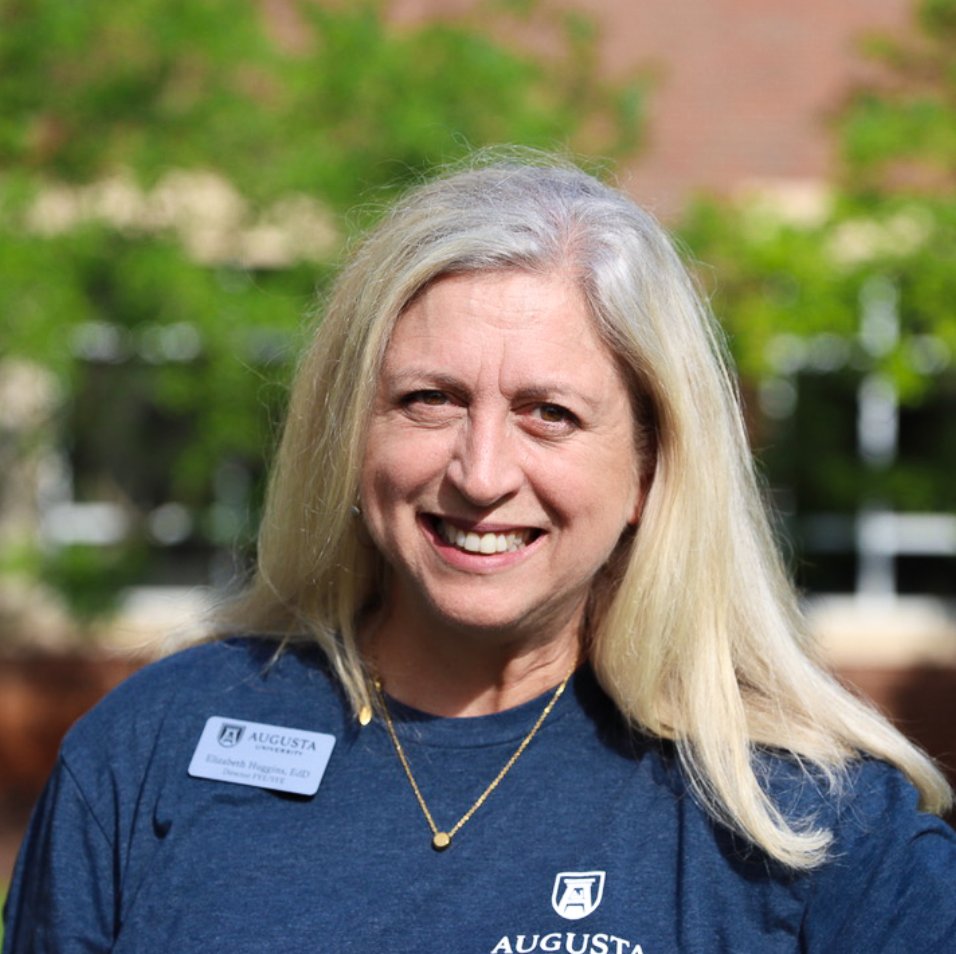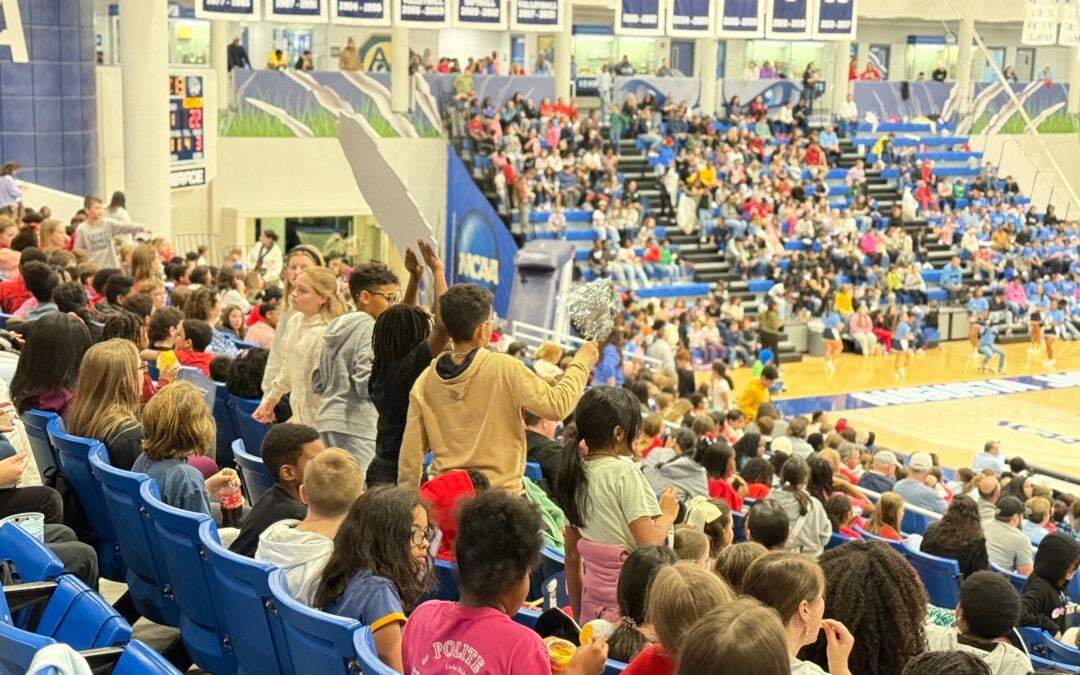Honoring her dedicated work at Augusta University’s First and Second Year Experiences Department, Elizabeth Huggins has recently been awarded the Outstanding First Year Student Advocate Award by the National Resource Center and Penguin Random House’s yearly campaign.
With support from colleagues Lorraine Evans, the executive director of AU’s Academic Success Center, and Zach Kelehear, vice provost, Huggins said she was able to collect and file all the necessary nomination paperwork for the National Resource Center award, and was honored to later be selected as one of 10 student advocates across the nation who will be recognized at the 43rd Annual Conference on the First-Year Experience in Seattle during February 2024.
“It was pretty overwhelming to be honest. I was very flattered, obviously, as students and my colleagues congratulated me, and I realized this was a much bigger deal than I had thought originally,” she said. “I cannot tell you how under-the-radar I’ve been trying to fly my whole life, so the idea of being promoted this way is just overwhelming.”
Thinking back on the beginning of her career at Augusta University, Huggins said she had always felt right at home with college freshmen and sophomores.
Teaching first-year students at Augusta University since 2000, Huggins later became the FYE/SYE first director in 2013, as a result of her dedication to students’ educational engagement.
“I used to be an instructor in the learning support department and I taught university 1000 courses for freshmen,” she said. “I just loved it and so it just seemed like a natural progression to go into the director position. I was really grateful to accept that position.”
Situated under academic affairs, Huggins said First and Second Year Experiences focus on assisting students with the transition to college by encouraging the cultivation of a collegiate mindset and connecting them with their future pathways.
“My responsibility is to provide what they call ‘high impact practices’ for students, to support their transitions from high school into college,” she said. “We do programming for freshmen, sophomores and most recently transfer students.”
Events and services offered by Huggins’ department include: Freshman Convocation, Jaguar Jumpstart, induction ceremonies, book clubs, end of year celebrations, honor societies, workshops, days of service and various other FYE/SYE events.
Referencing the Theory of Mattering, Huggins said she has always adopted the idea that encouraging an inviting and nurturing environment leads to more involved and interested students.
“It makes complete sense to me that if you feel you matter, to someone or something, you tend to show up. You tend to do your best job, and you tend to feel like there is a niche for you,” she said. “When someone feels like they matter, they’ll show up, and they’ll continue to show up which raises our retention numbers.”
With her experience in teaching, Huggins said she knows first hand how many students enter into college, because it was expected of them to pursue higher education as a next step – even if they are not 100% confident in what career they would like to pursue. This uncertainty of the future can sometimes lead students to feeling alienated and lonely.
“Sometimes in college, you come in and you don’t know if someone even cares if you show up to class or not,” she said. “But, because we’re a relatively smaller institution, we notice when people don’t show up to class, or miss a meeting, or we haven’t seen them in a while … and that can make all the difference in the world.”
Focusing on engaging students with academic and community interest early on in their university experiences, Huggins said a significant focus for her staff is attempting to build relationships and improve confidence.
“I’ve been trying to get our students to reinvent themselves, or to be thinking about reinventing themselves,” she said. “What they were in high school might not necessarily be the same person they want to be four years after having been through college, and all it takes is for somebody to believe in them. I think that’s the most important thing.”
While some students enter AU knowing exactly what degree and pathway they want to earn at AU, which she refers to as student “sharks,” others lead a more unsure freshman and sophomore year similar to jellyfish “floating” through the sea of life.
“At some point in the college career, usually during sophomore year, students’ switch will flip, and they’ll take a course or have an experience that makes them go, ‘oh my gosh, this is me. This is what I want to do,’” she said. “And that’s when they become more shark-like in, ‘if this is what I want to do, I need a college degree.’”
After such a transition occurs within students, Huggins said the “sharks” can now only move forward; although they may sometimes pivot or change directions, they will still continue to move forward.
“[This] generation differs,” she said. “My generation was much more linear, but [this] generation of students has an amazing ability to be able to pivot and be flexible. So, even if they get a degree in one area, that doesn’t dictate that the rest of their life they’re going to be doing the one job. I really admire that.”
However, alongside pursuing a career and earning a degree, Huggins said college needs to emphasize the importance of learning about one’s self.
“I think we need to share with students that it’s not just about what they learn in the classroom, but also what they learn about themselves as they navigate the college experience,” she said.
Always looking for ways to help students and ultimately the university, Huggins said she plans on using her prestigious award to further propel her department’s mission of improving campus inclusiveness and collegiately.
“I’m trying to ‘stay green’ by focusing on what messaging I would like to share out,” she said. “Thinking about what I would like to share when it comes to how fabulous our students are, and the wonderful education they’re getting here both in and out of the classroom here at Augusta University.”
For Huggins, the best part of her job and the recent award is further educating herself and being inspired by the endeavors of those around her, which is a lifelong lesson her mother instilled in her.
“I love talking to students about how they find themselves, and I learn a lot from that. Like I am always constantly learning from our students, and I love having a job where I can do that,” she said. “Even here in my mid-50s, I’ve really loved continuing to grow, and to change and to learn. I think if students can see that a mid-50 year old can win an award as an advocate, that says to them that learning is a lifetime sport … to keep themselves open to opportunities because you never know when the next one might open up to something that’s well beyond your imagination.”











